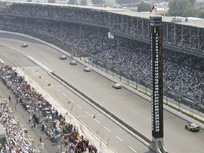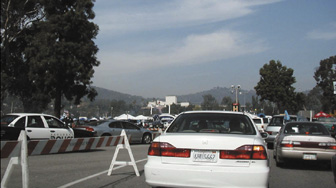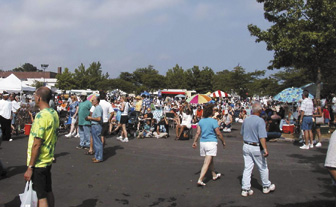| Skip
to content |
|
|
|
Planned Special Events Traffic ManagementThis publication is an archived publication and may contain dated technical, contact, and link information.Planned Special Events ChallengesPlanned special events cause congestion and unexpected delays to travelers by increasing traffic demand or reducing roadway capacity (e.g., street closures for parades). These delays are unlike congestion caused by routine traffic during daily peak travel periods. The frequency and severity of the impacts resulting from these disruptions are increasing significantly in both metropolitan and rural areas. Why We're ConcernedPlanned special events have the potential to affect not only the people traveling to the event, using the adjoining roadway network, or providing services in support of the event, but also the normal traffic using the adjoining roadways. Transportation users who may be affected include the general public, transit (e.g., regional, local, or specialized services), and other service providers such as law enforcement, medical, or fire responders.  To illustrate the challenges that public agencies and service providers face on a daily basis, it is estimated that in Los Angeles County alone there are approximately 1,000 planned special events each year. These challenges are not limited to only the largest metropolitan areas. Over five million people a year attend planned special events in Milwaukee, Wisconsin. Each year, over 400 planned special events influence travel along the I-94 freeway corridor in downtown Milwaukee. The impacts and challenges agencies face may be more severe if the planned special event is located in a rural area. Rural settings often have limited roadway capacity, alternative routes do not exist, access to the event site is restricted, and public services are not conveniently located to assist in managing traffic or providing support services that event patrons may require. An example could be a NASCAR race attracting over 200,000 people to an event site with restricted access that is served by only a few surface streets.  What We've LearnedUnlike traffic incidents, natural disasters, and adverse weather, public agencies typically have access to information on the location, time, duration, and demand expected for a planned special event. Public agencies can exploit this advanced information to minimize the impact these events may have on the general public, motorists, public agencies, and others service providers. It also provides an opportunity for agencies to plan, coordinate, share resources, deploy Intelligent Transportation Systems (ITS) technologies, and apply proven traffic management techniques to mitigate any possible adverse impacts that may result from these events. Communities can enhance their image by providing a safe, efficient, and convenient environment for those who travel to and from an event, while at the same time minimizing any congestion-related impacts it may have on other motorists. A trip that exceeds the expectations of those attending an event, or others whose trips may be affected by the event, are important factors to consider when making decisions regarding the provision of customer services and allocating agency resources.  Advanced planning and coordination also allows agencies to develop and deploy the operational strategies, traffic control plans, protocols, procedures, and technologies needed to control traffic and share real-time information with other stakeholders on the day of the event. These capabilities allow agencies to proactively manage and control traffic to accommodate the increased travel demand generated by the event and use the available roadway capacity in the most efficient and effective manner. The advanced planning, proactive management, and control of traffic in support of planned special events are not yet commonly accepted or consistently applied practices. This requires service providers, event operators, and public agencies that normally don’t work together to plan and coordinate activities prior to, during, and after an event. It also requires the commitment and allocation of the necessary resources to support these recommended activities and practices. Current practices are typically event specific and may not be performed for all planned special events within a regional or metropolitan area. Improving current practices may require new local initiatives focused on facilitating the advanced planning, coordination, proactive management, and control of traffic for all planned special events within a region or for specific events. Using these recommended practices provides an opportunity to incorporate these techniques and concepts into the day-to-day policies, procedures, and practices of an agency. Future DirectionsThe proactive management and control of traffic in support of planned special events is one area that can have a positive impact on relieving congestion, one of FHWA's "Vital Few" priorities for attention and near-term action. FHWA will pursue a number of initiatives to advance local practices in proactively managing and controlling traffic for planned special events. These initiatives will involve: Collaboration and Consensus BuildingFormulate and gain acceptance of the research and technology transfer needs to advance the practices of agencies. Raise Awareness and Motivate ActionFacilitate peer-to-peer exchanges, regional workshops, executive briefings, and tabletop exercises to raise the awareness of agencies of benefits to improving current practices. Technical Guidance and Capacity BuildingDevelop and deliver guidance material, training, and self-assessment tools for agencies to assess and develop action plans to improve current practices. Applied ResearchDevelop tools, conduct field operational tests, quantify potential benefits, and prepare materials to assist with implementing innovative applications. The near-term priorities for projects to be pursued will focus on:
Expected Products and MilestonesThe handbook, Managing Travel for Planned Special Events, was completed in late 2003 and is now available on https://ops.fhwa.dot.gov/program_areas/sp-evnts-mgmt.htm. In 2004, FHWA will hold a pilot training course and co-sponsor a national conference on Managing Travel for Planned Special Events (for updated information please see www.itsa.org/pse_conference.html). FHWA will also identify action items to advance the current state-of-the-practices on managing travel for planned special events. For more information on FHWA Office of Operations activities, visit our web site at https://www.fhwa.dot.gov/operations April 2004 FHWA-OP-04-046
|
|
United States Department of Transportation - Federal Highway Administration |
||